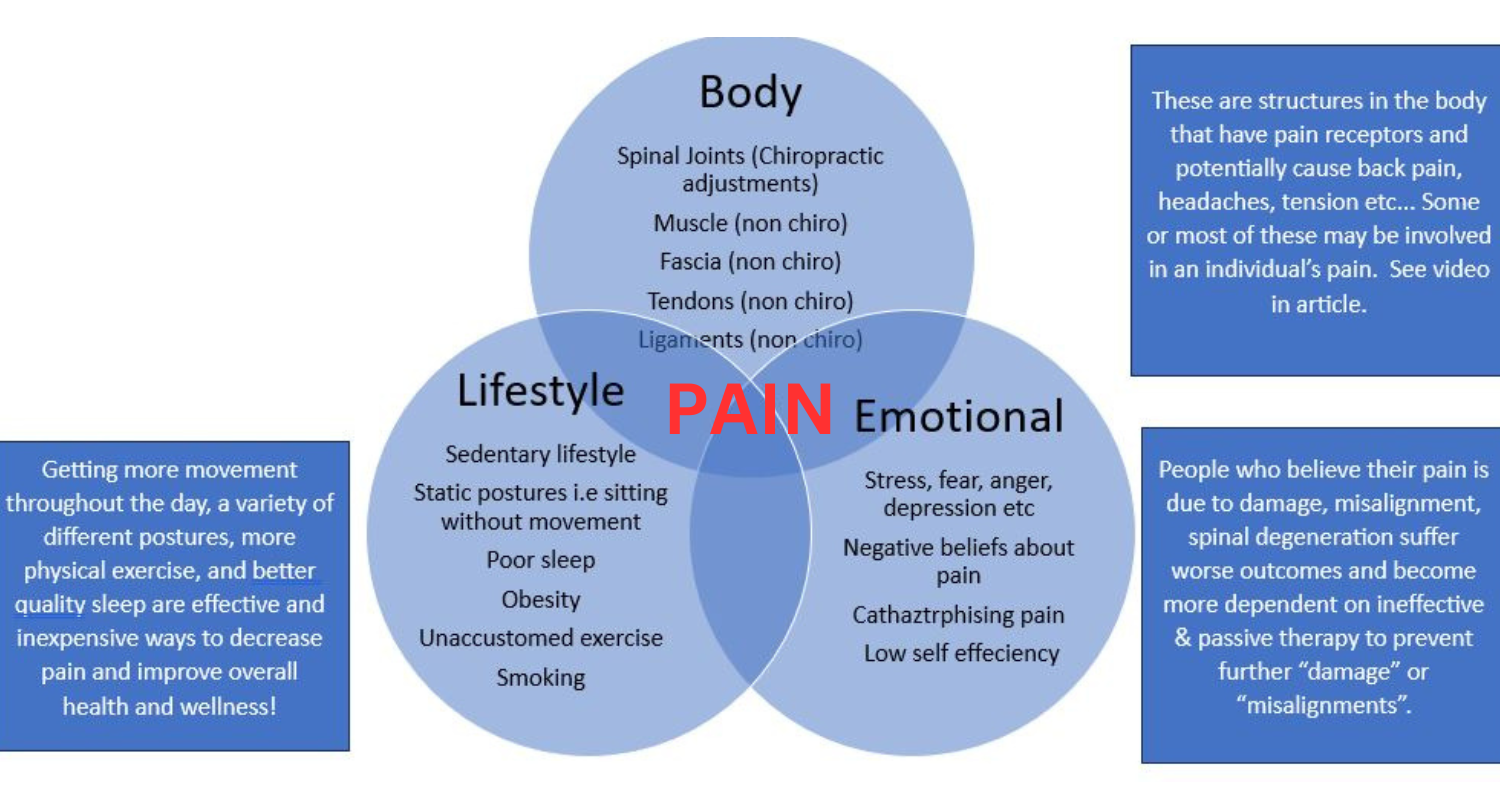Educating pain sufferers that pain may not be just a physical problem and may involve our mental/emotional health and our lifestyles. How we perceive the cause of our pain can greatly impact our emotional & physical response to pain and can have a dramatic effect on the amount of pain we feel. Research shows, that people who attribute their pain as a result of their spine being damaged or misaligned often suffer more pain and for longer periods and spend more money on ineffective therapies compared to people who are educated with a more evidence-based and holistic understanding of their pain.

Many people find sitting to be the main aggravating factor with their pain and wrongly associate it with having “poor posture”, I often give advice rather than focussing on having an upright/rigid posture, which usually tightens the postural muscles more, focus on trying to get more movement throughout the day, sometimes the lack of movement itself when sitting may not be the issue, but heightened levels of stress while at work, it just so happens you are sitting while stressed. So this may change the things to focus on when dealing with back pain.
Exercise and our lifestyles can also have a dramatic effect on back pain, a very recent study showed back pain sufferers who partook in a walking program combined with education (similar to above) found they had far fewer recurrences of low back, walking is accessible and inexpensive, hopefully, your health care provider is discussing strategies such as these rather than getting you to sign up for the long term and expensive “rehab” programs or getting you to come back regularly to “re-align” your spine. Getting good hands-on treatment that undresses the myriad of physical contributors of pain (muscles, fascia, joints, tendons ligaments) should complement a healthy lifestyle and exercise for the best pain management strategies.
services

-01
Chiropractic
Chiropractic is a 5 year university degree specialising in the diagnosis and treatment of the musculoskeletal disorders and injuries with particular emphasis on the spine. The adjustment is the hallmark of chiropractic and is what is commonly known as “cracking” which is a very specific technique to the facet joints of the spine to restore proper movement, function and reduce pain. Chiropractors are taught muscle and orthopedic testing procedures to help diagnose musculoskeletal conditions as well as extensive human anatomy and physiology.

-02
Spinal and Deep Muscle Manipulation
Kieran began studying remedial and sports massage in 2005 and has continually added and refined his skills, discontinued treatments he felt weren’t effective and has now developed his own unique style of massage & muscle therapy that combines several disciplines such as sports massage myotherapy (SLM), Stecco Method, trigger point therapy and myofascial release to name a few. These combinations of skills and techniques combined with chiropractic is not offered anywhere else in Australia, and makes it one of the most wholistic and complete muscle and spine treatments.

-04
Cupping and Dry Needling
Similar to cupping, Chinese medicine was using acupuncture long before dry needling started to be used by western therapies although the training, theory and philosophy is very different, however, the technique of inserting very fine needles is very similar. Dry needling is often used at trigger points or “knots” to help ease pain. Kieran uses dry needling sparingly as he has found the hands on muscle work and cupping is more effective for most people, and only uses it in very specific cases to improve outcomes.

-05
Pregnacy Chiro and Massage
Cupping was first used in Chinese medicine and is now also used by western trained therapists as a complementary treatment to massage for the muscles and fascia. A cup is placed on certain area’s or points on the body, usually at the site of pain and corresponding area’s of tension and tightness, using a hand held pump a vacuum is created and the muscles and fascia are drawn into the cup creating a localised area of stretch and blood flow to help relieve muscle tension. Kieran will often put the cups on one area while simultaneously treating another area of the body so your in effect getting multiple area’s treated at the same time.

